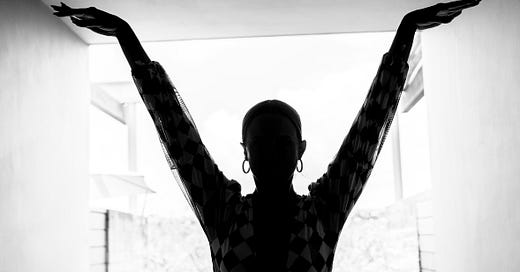Welcome to my first private podcast episode, just for subscribers of Comfort Watch!
Normally, the private podcast episodes will be an exclusive for paid subscribers only, but I am gifting access to this first episode to ALL of you.
Love the episode and want to make sure you get access to the next one? Upgrade your subscription to the paid level and it will all be yours - I appreciate you so much!
As you may know, I’ve been thinking a lot over the past few months about the inherent performance of online life, which has seeped into the rest of life as well.
I used to work in the entertainment industry as a professional performer, so I know as much as anyone the power of performance when used intentionally. Personally, I don’t believe that behaving in a performative way is always a bad thing.
And let’s face it - pretty much the entire purpose of sharing things online is to be perceived, which is inherently performative. I honestly don’t know a way around that completely.
The act of turning up the volume on who we truly are at our core is an element of performance as glamour magic, which I previously taught the students of my former Bizcraft course.
glam·our (noun) - 1. an attractive or exciting quality that makes certain people or things seem appealing 2. ARCHAIC enchantment; magic.
glamour magic (as defined by me) - the act of using ritual, spell, and other spiritual workings to influence how you are seen by others (rather than what they see, as famously portrayed in the changing hair color scene in The Craft)
Using glamour magic can be empowering. It has the ability to allow us to blossom into who we truly feel we are meant to be; used in such a way, glamour magic is a powerful force for self-actualization and personal empowerment around what we invite others to perceive about us and what is kept private.
If we become too attached to a glamour, however, it’s incredibly easy for it to take over our perceptions of the whole of who we are. After all, a glamour is only presented from a part of ourselves singled out to become expressed in a more dominant way. It isn’t the full story, and it’s my belief that a glamour loses effectiveness the more cognitive dissonance there is between who we choose to be in public versus who we are in private.
And this is where things get hairy when we take into account our interactions with others, both on- and offline. At what point are we glamouring ourselves into content for others in a way that takes away from the connection we feel to others, to our lives, and to our own identities?
I ask these questions and more in the podcast - listen below.
I also riff on the questions recently shared in a recent piece in Your Therapy Takeaway that I found so relevant to this conversation. I’ve copied and pasted the questions below from that original piece so that you can examine your own answers.
1) When does it happen that you feel pulled to perform? Does it happen in some circumstances more often than others? And when doesn’t it happen?
2) What feelings and thoughts come up? Whenever I have felt pulled outside of myself, it’s typically accompanied by a flood of negative self-talk and anxiety.
3) What’s it like to be with others in a way that isn’t performative? Was there a time where you felt like being with others actually connected you back to yourself? What was it like to feel that?





Share this post